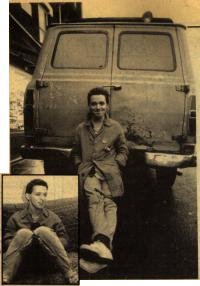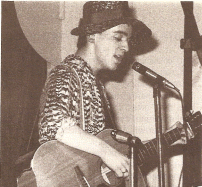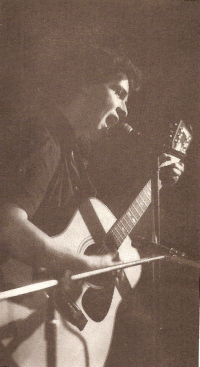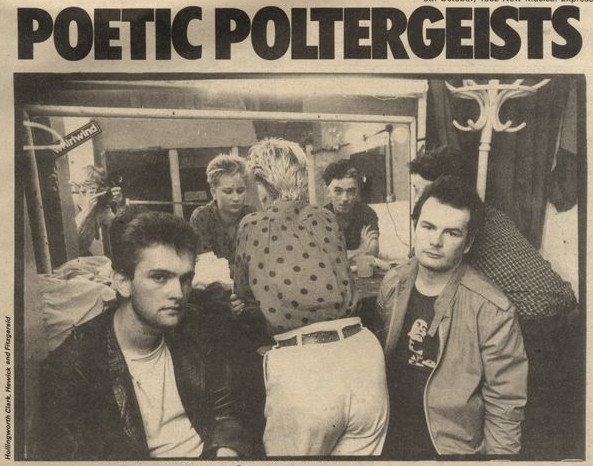[Patriks own take on his biography.]
Patrik Fitzgerald was born Patrick Joseph Anthony Fitzgerald, in Stratford East London March 19 1956, of working-class Irish immigrant parents. After finishing school, he spent 3 years on the dole, one and a half year in an insurance office, three months in Co-op offices in Stratford and six months with the Civil Services. He started recording and performing with the uprising of the punk movement in 1977, after working 9 months as an actor and musican in the Soapbox Theatre in Stratford. He auditioned for London SS with Mick Jones (The Clash) and Tony James (Generation X) in 1975.
Early songs were generally short, sarcastic efforts, recorded with just an acoustic guitar and occasional studio effect; lyrics contained large amount of social comment, brief and hard-hitting they made their point and then went home, not unlike Patrik himself... Patrik was soon regarded as an original of his genre, somewhere between a punk-poet and an urban folksinger. The early recordings (3 EPs) were released by Small Wonder.
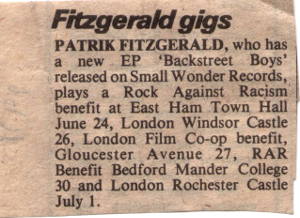
Photo above illustrated an article in NME feb 11 1978 page 21:
The bard of Stratford (London E15).
How he was received at the time can be gleaned from this recollection of a Hawklords show in Portsmouth Guildhall October 16th 1978 (lifted from http://www.starfarer.net/moregigs.html).
We thought something was up when we got into the hall, as we could see only one band's equipment on stage, not the support band's gear inside and within the main act's setup. The reason why became apparent when the support act came on: acoustic punk Patrik Fitzgerald. This bloke had made something of a stir in the national music press and did a well-received EP called Safety Pin Through My Heart. He was kind of a prototype Billy Bragg, but without the Essex. In a later interview with the Melody Maker or the NME, Patrik Fitzgerald was asked why he subjected himself to hostile crowds like Hawkwind's and Sham 69's. (I don't recall his answer, but the real reason must have been something to do with earning a living!). Anyway, on this occasion the crowd was robust but not hostile, and they were at least attentive. There was quite a bit of heckling (Tuck your shirt in!) which Patrik Fitzgerald was stage-smart enough to turn into a bit of stage-audience banter. He had come on in a loose baggy shirt, clutching a bottle of beer and what looked like an oversize acoustic guitar: probably just a dreadnought, but he was one of those little skinny punks, a bit ratlike. I don't know his material but most songs sounded the same: a fast-paced acoustic rattle through three minutes of unexceptional guitar chord progressions and inaudible street poetry. That sounds damning, but he was all right - the songs were good, but the atmosphere wasn't there. Being unplugged, the volume was very low, and this didn't raise the temperature in the way that a full-blown support band might have done. I think he went off to some fairly decent applause.
Patrik talks about what it looked like from the other side of the guitar, in an excellent interview on the 84 tigers site:
I was received in the punk clubs in a combination of different ways. Because I was physically small and thin, I looked rather waif-like and in need of protection. I would get the most hardcore of punks saying, "Well, they might not like you, but we do; so if they give you any aggravation, we'll kick the shit out of them." I guess there was an oddball side to what I was doing that most people thought was interesting - a weedy-looking person shouting their mouth off along with everybody else, so there was that surprise quality. And at punk things, a lot of peple wanted to storm the stage, to share the stage or whatever, and with me it was easy: you could be seen on stage and you could protect me, so it was a funny scenario with a lot of odd psyches at work. Later on, I used to do a lot of gigs with Sham 69, who were followed by totally heavy skinheads, and I could actually get out of a room full of skinheads alive, even though I'd talk politics with them and tell them I was totally the opposite of them and didn't agree with anything they were saying. And they wouldn't storm the stage to beat the shit out of me - they might do sometimes for Sham 69 or the Cockney Rejects, but for me they'd just think "he's not really worth bothering about, he'll go away soon and leave us alone". I did have an amusing conversation with a roomful of Sham roadies, friends and hangers-on, who came from the same part of London as me, who were saying things to me like, "Aren't you a communist?" "Well, actually - no". And they were totally confused - "But you get on OK with Black people and Indians and things, so why's that then?" I suppose I could've said, "Because I was nearly in The Clash", but they would've taken that to mean "You weren't good enough to be in The Clash!". It was impossible to give an answer they'd understand, so they'd get fed up and talk about the football. Even then, they'd say to me, "Did you go and kick the shit out of this team or that team?"
With The Clash, it was odd - the biggest gig I played was the 1978 Rock Against Racism festival in Victoria Park that was headlined by The Clash, and I was canned off the stage. Most of the canning was done by Clash fans down the front! I was in awe of The Clash, and the Sex Pistols: I never really met the Pistols, but I'd see Cook and Jonesy at clubs because they'd hang about everywhere. Rotten never did, and the others never did, but those two were everywhere, being pop stars, which was how everybody thought of them. But like a lot of other people of my generation who were slightly outside of the punk inner circle, I felt quite disappointed with The Pistols, The Clash and people like Stiff Little Fingers, because I felt that it was all a front that wasn't actually genuine, and they were just swanning about posing in guerilla uniforms, or gorilla suits, whichever. I think that people who came from outside that inner circle, the second wave if you like, were in fact more genuine - The Fall, Subway Sect, a lot of these were more punk than the originals. But I think not being part of the punk inner circle was a reason why a lot of people liked me as well. It soon became obvious to people from my era of it how much it was "show business" - The Clash and the Sex Pistols became more about their followers who were seen as part of their contingent, and even more so than that, became about their management: Malcolm McLaren and Vivienne Westwood, and Bernie Rhodes, being the media manipulators. It becomes blurry - I think "What was real, and what wasn't real?" It's all a bit like that, really.
CBS had a go first it seems.
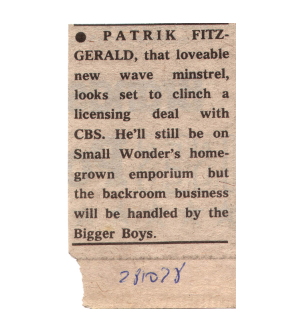
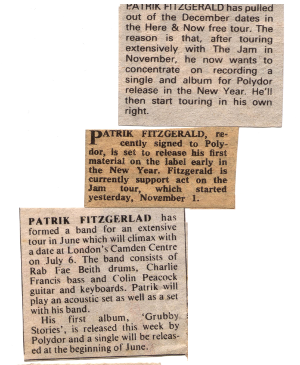 But Patrik ended up on Polydor and recorded his first LP, 'Grubby Stories', which
featured his first dabblings with a group.
The LP contained 17 tracks, 7 of them with the group.
But Patrik ended up on Polydor and recorded his first LP, 'Grubby Stories', which
featured his first dabblings with a group.
The LP contained 17 tracks, 7 of them with the group.
This was his most visible moment publicity-wise. Polydor had money to spend on good photographers, this is by Pennie Smith:
Here's another (not by Pennie Smith?)

During 1978 and 1979 interviews and gig-reviews occured frequently in the music press:
- THE BARD OF STRATFORD (Patrik Humphries in NME February 11, 1978)
- Patrik Fitzgerald Marquee (Lindsey Boyd in Sounds April 15, 1978)
- Putting cats in liquidisers is wrong (Lindsey Boyd in Sounds April 29, 1978)
- John Betjeman of the blank generation (Gary Bushell in Sounds November 4, 1978)
- Patrik Fitzgerald at the Poly (Whats on in London, november 78)
- 'NOTHING BUT THE REAL ME' (Graham Lock in NME February 24, 1979)
- Crisp. In a crunchy sort of way (Paul Morley in NME 79?)
- Moonlight Club (NME), Hope and Anchor (Sounds)
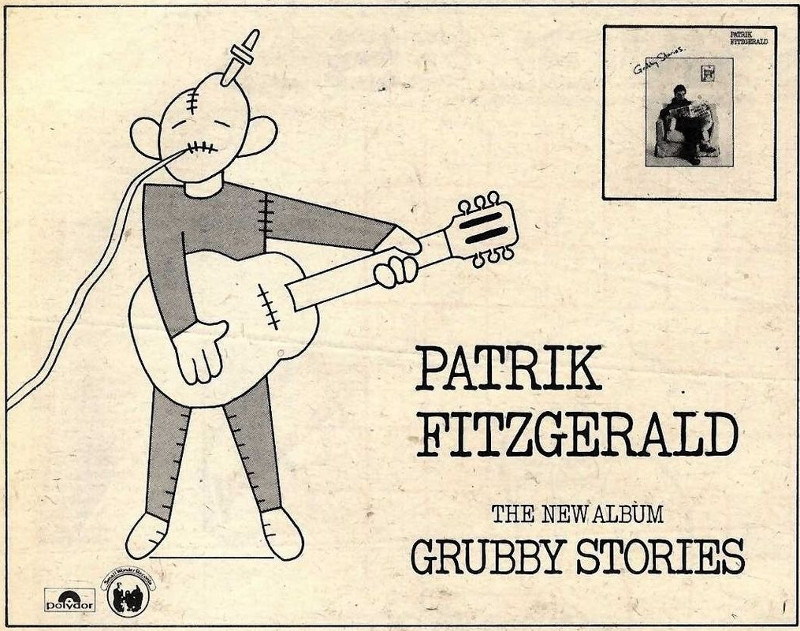
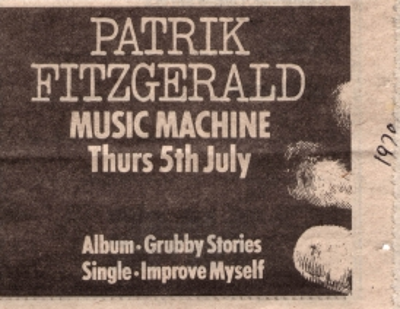
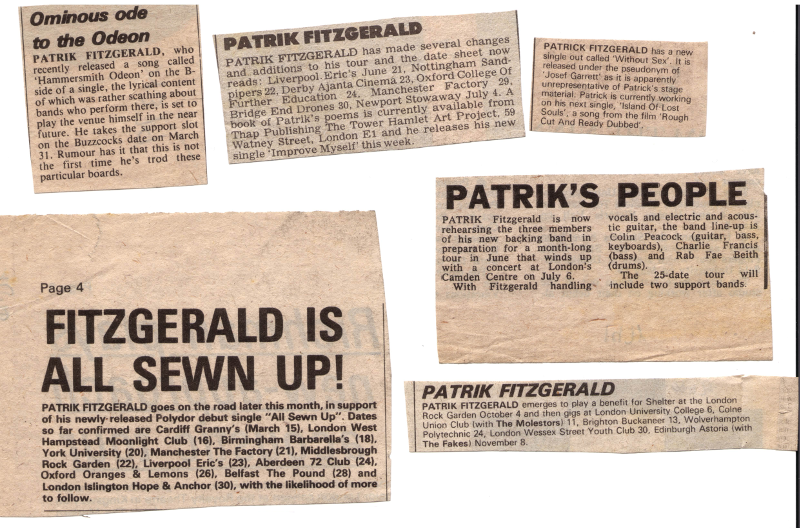
A band was formed to play live: Colin Peacock (guitar,bass,keyboards), Charlie Francis (bass) and Rab Fae Beith (drums). With the group Patrik recorded two singles and did a tour before disbanding. Then Polydor dropped him.
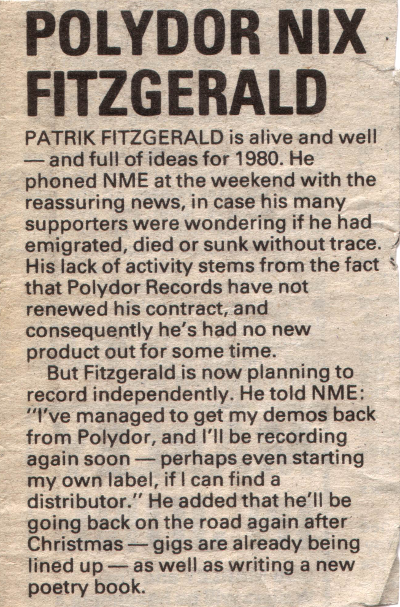
For a while, Patrik continued to play solo acoustic concerts, gradually
forsaking the ironical, sarcastic mode for a more deeply-etched, darker
formulation, which hovered on the lip of despair.
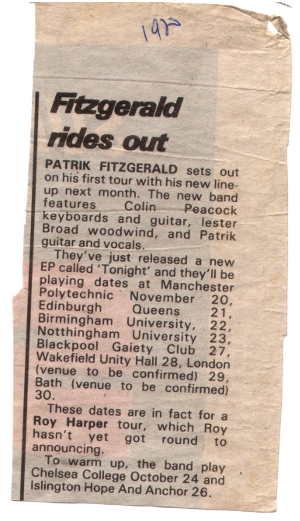 Then, a new group was formed with which he released the 'Tonight' EP
(on Final Solution); Half moody, half bright, it hit a lot of nerves.
This new group was yet another off-beat mixture, the brilliant Lester Broad (Lester Moses)
on saxes and flutes, and the expressive Colin Peacock on electric guitar
and keyboard. Combining it with Patrik's raw and chiming guitars resulted in
a unique "jazz-punk" sound. The banshee wail, of the voice and saxophone,
sent many heads, spinning, to late nights, probably spent alone.
The group went on to play live, extensively touring Europe and also played a
number of concerts in Britain, performing regularly at West Hampsted's
Moonlight Club during 1980 and 1981. Success on a large scale eluded them,
however, and they disbanded in 1981.
Then, a new group was formed with which he released the 'Tonight' EP
(on Final Solution); Half moody, half bright, it hit a lot of nerves.
This new group was yet another off-beat mixture, the brilliant Lester Broad (Lester Moses)
on saxes and flutes, and the expressive Colin Peacock on electric guitar
and keyboard. Combining it with Patrik's raw and chiming guitars resulted in
a unique "jazz-punk" sound. The banshee wail, of the voice and saxophone,
sent many heads, spinning, to late nights, probably spent alone.
The group went on to play live, extensively touring Europe and also played a
number of concerts in Britain, performing regularly at West Hampsted's
Moonlight Club during 1980 and 1981. Success on a large scale eluded them,
however, and they disbanded in 1981.

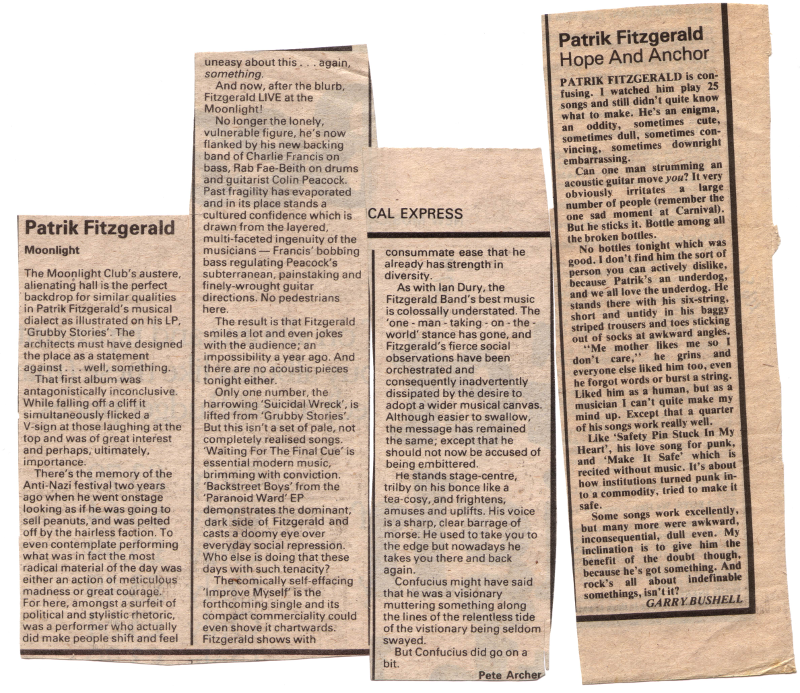
A concert at City University London, also featuring The Raincoats and The pop group was reviewed by Paulo Hewitt in Melody Maker 5.4.80.
Rami found these two posters in a collage of Final Solution posters:
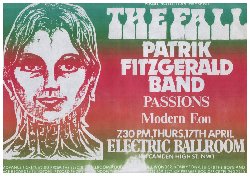
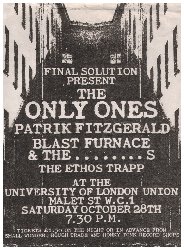
With Colin Peacock he played two song on the video "Rough cut and ready dubbed" (1981). Here he is, guitar and hat and all:

Now unmanaged, Patrik returned again to acoustic solo performance, then releasing a single under the pseudonym Josef Garrett, then, using a borrowed Revox, he began recording a series of backing tapes to use in live performance. These recordings, based partly on the former group's unreleased material, with Patrik playing everything, were released in 1982 by Red Flame, which became Patrik's home ever since, on an excellent LP, 'Gifts and Telegrams'. The music is minimalistic, acoustic guitar in the shadow of electric devices of sorts, the lyrics deal with Patrik's inner, rich world of feelings and views, penetrating to the very depths of his soul, and the listener's likewise.
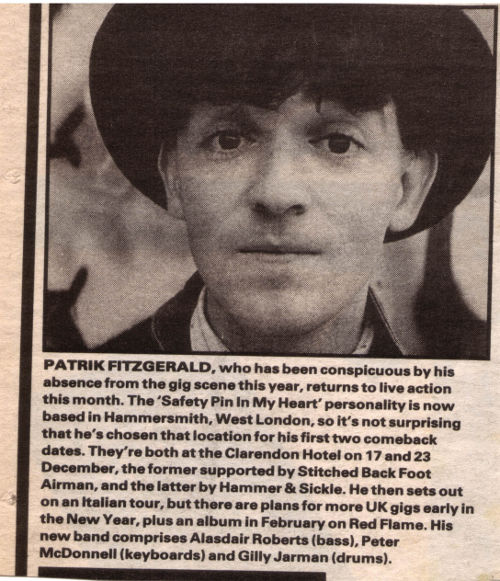
At this point, Patrik formed a small group of solo performers, working under the banner, 'Ghosts of Individuals', and featuring himself, David Harrow, U.V. Pop (John Kevin White), Kevin Hewick and Anne Clark. The forerunner of London's cabaret scene, the Ghosts, like Patrik's music, was aimed at, and appealed to London's loners. NME interview Oct 9 1982
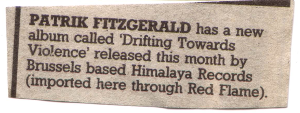 Following this, in mid 1983, Patrik formed a collusion with a peripheral
musician from the Ghosts, clarinet player Alistair Roberts, and along with
three more brass instruments players he recorded his next LP, namely
'Drifting Towards Violence'. The music on it is mostly acoustic, accompanied
by the gloomy sound of the brass section and the ever so hard-hitting lyrics
this LP presents a real tough nut to crack.
Released by Belgian label Himalaya the record went completely unadvertised,
and, consequently, sunk without leaving a trace. For Shame.
The release was followed by a solo tour of Europe, where Patrik has retained
a loyal following.
Following this, in mid 1983, Patrik formed a collusion with a peripheral
musician from the Ghosts, clarinet player Alistair Roberts, and along with
three more brass instruments players he recorded his next LP, namely
'Drifting Towards Violence'. The music on it is mostly acoustic, accompanied
by the gloomy sound of the brass section and the ever so hard-hitting lyrics
this LP presents a real tough nut to crack.
Released by Belgian label Himalaya the record went completely unadvertised,
and, consequently, sunk without leaving a trace. For Shame.
The release was followed by a solo tour of Europe, where Patrik has retained
a loyal following.
For three years Patrik made no new recordings, instead keeping body and soul together by working as a waiter at Mansion House, the Lord Mayor of London's official residence...
In 1986 he released 'Tunisian Twist', which introduced a radical change of style. Planned as a kind of pop record, approachable, but not throwaway, the original intention was to call it 'Light' or 'Light-Hearted' , as opposed to the previous one.
The album features a guitar-bass-drums-keys band, with a brass section; its sound is thus much fuller than Patrik has ever put out. The lyrics deal with subjects as diverse as terrorism, surrogate birth and trade unionism in the climate of Thatcher's 'economic realism'. While some of the songs are heavy with ironic humour in the manner of Patrik's early days, there remains the biting incisiveness which has always been his hallmark.
In that year he also contributed a duo with Anne Clark to the compilation LP 'Abuse - Artists For Animals' , dealing with the controversy of bullfights.
Then, for 7 years, Patrik remained silent. Before releasing yet another record (CD) on Red Flame, titled 'Treasures from the Wax Museum', which is mostly a compilation of early 80s material, with four new tracks.
In 1994 he released 'Pillow tension' on the greek label Lazy Dog and moved to New Zealand.
The Guiness Encyclopedia of Popular Music (2nd ed. 1995) writes of his life after "Tunisian Twist":
.. by the 80s his studio work was received by a dwindling audience. 1986's "Tunisian Twist" was a brave attempt at commercial renewal, before he faded from view. Taking a job as a waiter at the House of Commons, he then relocated to Normandy in France in 1988. However, he found himself disenchanted and unable to find gainful employment, and so returned to England three years later. He started playing gigs again, and also launced an acting career, the most high profile engagement of which was a version of Moliere's "The Miser" at Stratford. In 1994 he was said still to be plotting a musical comeback, making ends meet with temporary market research work.
Beat Bedsit Records issued 'Room service' a CD with new bedroom recordings in 2001.
The album 'Floating Population' (2006) was issued to coincide with an European tour with Attila the Stockbroker. It contains a few new songs and alternative versions/recordings of songs spanning his entire career.
'Dark side of the room' (2006) is a split CD with the band POG. It contains 12 tracks from Patrik Fitzgerald, mostly versions of old songs.
He lived in New Zealand from 1995 - 2012. Current abode London.
Links
- VIVONZEUREUX! VIRTUAL LABEL has a good introduction to PF.
- Come and get your punk in woolworths
- Patriks blog
- Patriks webpages
- Swedish page on PF
- Live Out My Stars: The Punk Poetics of PATRIK FITZGERALD Archived at Wayback machine (copy of text)
- punk77's feature on PF
- Entry in the Pretending Life Is Like A Song blog.
Email:
Vidar Ringstrøm - [vidar@hanshan.org]Rami Zakh - [r2zakh@gmail.com]
